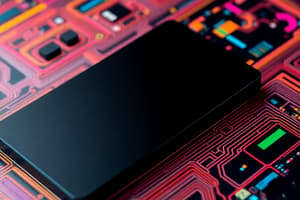Podcast
Questions and Answers
A hard disk drive (HDD) uses solid-state technology for storing data.
A hard disk drive (HDD) uses solid-state technology for storing data.
False (B)
USB flash drives are used primarily for transferring files between computers.
USB flash drives are used primarily for transferring files between computers.
True (A)
Cloud storage allows users to store data on local devices only.
Cloud storage allows users to store data on local devices only.
False (B)
Solid State Drives (SSDs) can access data almost instantly.
Solid State Drives (SSDs) can access data almost instantly.
Compact Discs (CDs) are a type of permanent storage.
Compact Discs (CDs) are a type of permanent storage.
Memory cards are used only in desktop computers.
Memory cards are used only in desktop computers.
Hard Disk Drives (HDDs) are typically faster than Solid State Drives (SSDs).
Hard Disk Drives (HDDs) are typically faster than Solid State Drives (SSDs).
Temporary storage refers to storage that retains data permanently.
Temporary storage refers to storage that retains data permanently.
Optical discs include storage types like DVDs and Blu-rays.
Optical discs include storage types like DVDs and Blu-rays.
Flash drives are a type of optical storage.
Flash drives are a type of optical storage.
Flashcards
Hard Disk Drive (HDD)
Hard Disk Drive (HDD)
A traditional storage device that uses spinning disks to save data.
Solid State Drive (SSD)
Solid State Drive (SSD)
A newer storage type, faster than HDDs, using flash memory.
USB Flash Drive
USB Flash Drive
A small, portable device used to store and transfer files.
Memory Cards
Memory Cards
Signup and view all the flashcards
Cloud Storage
Cloud Storage
Signup and view all the flashcards
Optical Discs (CDs/DVDs)
Optical Discs (CDs/DVDs)
Signup and view all the flashcards
Computer Storage
Computer Storage
Signup and view all the flashcards
Temporary Storage
Temporary Storage
Signup and view all the flashcards
Permanent Storage
Permanent Storage
Signup and view all the flashcards
Storage Device
Storage Device
Signup and view all the flashcards
Study Notes
Computer Storage Types
- Computer storage is any physical device that stores information temporarily or permanently.
- Storage devices are hardware components used to store, move, and retrieve data files and objects.
- Storage types can be categorized as permanent (long-term) or temporary (short-term).
Examples of Permanent Storage Devices
- Compact Disc (CD): A type of optical disc used for storing digital data, commonly used for music and movies.
- Hard Disk Drive (HDD): A traditional storage device that uses spinning disks for data storage and retrieval. Data is stored magnetically on the disks.
- Solid State Drive (SSD): A newer storage device that uses flash memory, faster than HDDs, typically without moving parts.
- USB Flash Drive: A small, portable device that connects to a computer to store data using flash memory, convenient for transferring files and backups.
- Memory Cards: Removable storage cards, often used with digital cameras, smartphones, or other devices.
Examples of Temporary Storage Devices
- Temporary storage is used for short term storage, for tasks like running a program. This type of storage is often faster but is lost when turned off.
Measuring Memory Storage Sizes
- Memory sizes are measured in increasing increments: bit, byte, kilobyte, megabyte, gigabyte, and terabyte.
- A byte is 8 bits.
- A kilobyte is 1,024 bytes.
- A megabyte is 1,024 kilobytes.
- A gigabyte is 1,024 megabytes.
- A terabyte is 1,024 gigabytes.
Cloud Storage
- Cloud storage is a service that stores data on remote servers. Data is accessed via the internet.
Optical Discs
- Optical discs use lasers to read and write data. Common examples include CDs, DVDs, and Blu-ray discs.
Memory Cards
- Memory cards are small removable storage devices frequently used in electronic devices like cameras, smartphones, tablets, and digital audio players. They store files like photos, videos, music, etc.
Studying That Suits You
Use AI to generate personalized quizzes and flashcards to suit your learning preferences.




